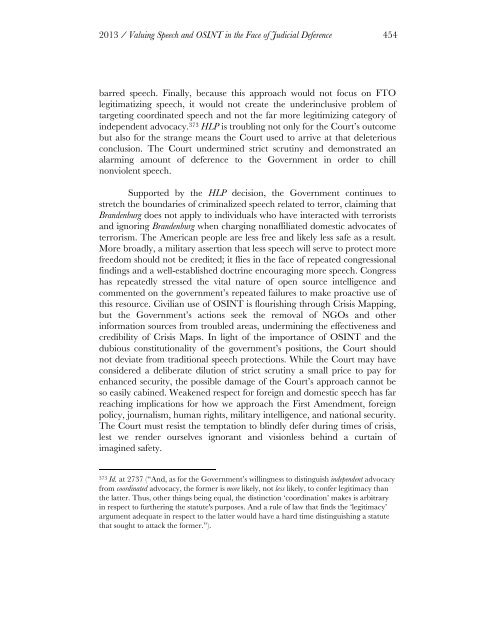Vo.4-Moshirnia-Final
Vo.4-Moshirnia-Final
Vo.4-Moshirnia-Final
You also want an ePaper? Increase the reach of your titles
YUMPU automatically turns print PDFs into web optimized ePapers that Google loves.
2013 / Valuing Speech and OSINT in the Face of Judicial Deference 454<br />
barred speech. <strong>Final</strong>ly, because this approach would not focus on FTO<br />
legitimatizing speech, it would not create the underinclusive problem of<br />
targeting coordinated speech and not the far more legitimizing category of<br />
independent advocacy. 373 HLP is troubling not only for the Court’s outcome<br />
but also for the strange means the Court used to arrive at that deleterious<br />
conclusion. The Court undermined strict scrutiny and demonstrated an<br />
alarming amount of deference to the Government in order to chill<br />
nonviolent speech.<br />
Supported by the HLP decision, the Government continues to<br />
stretch the boundaries of criminalized speech related to terror, claiming that<br />
Brandenburg does not apply to individuals who have interacted with terrorists<br />
and ignoring Brandenburg when charging nonaffiliated domestic advocates of<br />
terrorism. The American people are less free and likely less safe as a result.<br />
More broadly, a military assertion that less speech will serve to protect more<br />
freedom should not be credited; it flies in the face of repeated congressional<br />
findings and a well-established doctrine encouraging more speech. Congress<br />
has repeatedly stressed the vital nature of open source intelligence and<br />
commented on the government’s repeated failures to make proactive use of<br />
this resource. Civilian use of OSINT is flourishing through Crisis Mapping,<br />
but the Government’s actions seek the removal of NGOs and other<br />
information sources from troubled areas, undermining the effectiveness and<br />
credibility of Crisis Maps. In light of the importance of OSINT and the<br />
dubious constitutionality of the government’s positions, the Court should<br />
not deviate from traditional speech protections. While the Court may have<br />
considered a deliberate dilution of strict scrutiny a small price to pay for<br />
enhanced security, the possible damage of the Court’s approach cannot be<br />
so easily cabined. Weakened respect for foreign and domestic speech has far<br />
reaching implications for how we approach the First Amendment, foreign<br />
policy, journalism, human rights, military intelligence, and national security.<br />
The Court must resist the temptation to blindly defer during times of crisis,<br />
lest we render ourselves ignorant and visionless behind a curtain of<br />
imagined safety.<br />
373 Id. at 2737 (“And, as for the Government’s willingness to distinguish independent advocacy<br />
from coordinated advocacy, the former is more likely, not less likely, to confer legitimacy than<br />
the latter. Thus, other things being equal, the distinction ‘coordination’ makes is arbitrary<br />
in respect to furthering the statute's purposes. And a rule of law that finds the ‘legitimacy’<br />
argument adequate in respect to the latter would have a hard time distinguishing a statute<br />
that sought to attack the former.”).
















